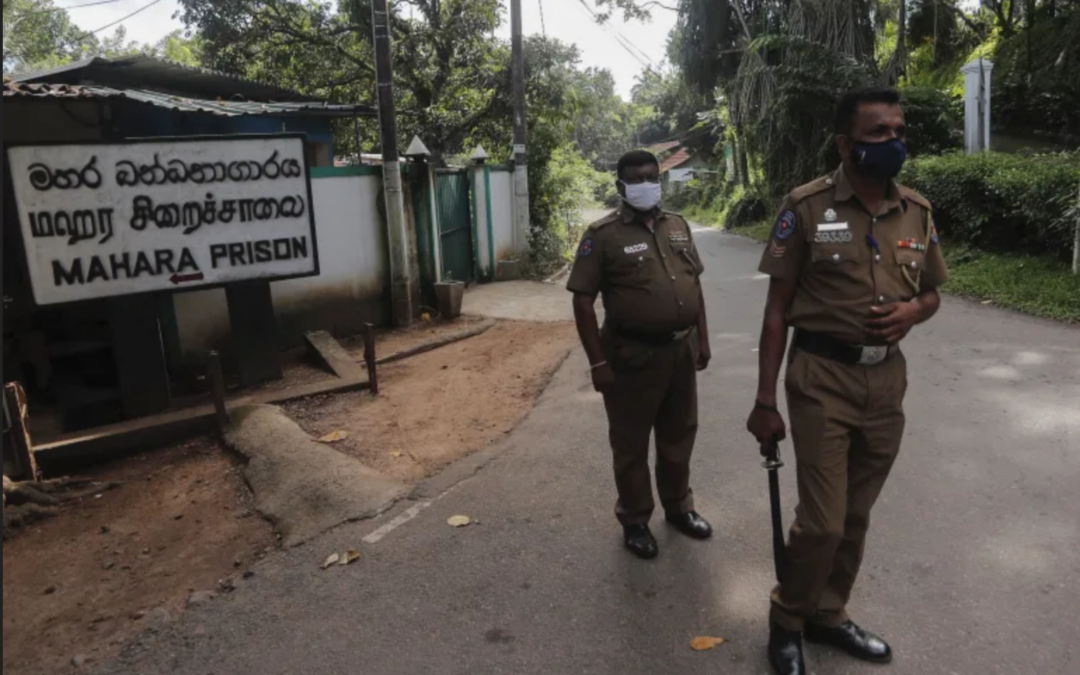
Dec 2, 2020 | News
The ICJ today called upon the Sri Lankan authorities to conduct a prompt, thorough and impartial investigation into the events involving the use of lethal force by prison guards at Mahara prison on 29 and 30 November, which left at least nine inmates killed and over hundred others injured.
The action by the guards was taken in response to unrest resulting from protests by inmates over unsafe and overcrowded conditions in the context of the COVID-19 pandemic.
The ICJ also called for urgent measure to address the unsafe conditions in Sri Lankan prisons to protect the right to health and life, including where necessary by releasing detainees.
“The tragic events of Mahara prison are a consequence of the failure of the Sri Lankan authorities to effectively address the situation of prison conditions, which has turned into a full blown human rights and public health crisis in the wake of the COVID-19 pandemic”, said Ian Seiderman, ICJ Legal and Policy Director
The unrest was the culmination of a series of protests staged by the prisoners demanding an increase in coronavirus testing and new isolation facilities for infected prisoners. According to Senaka Perera, President of the Committee for Protecting the Rights of the Prisoners, around 200 inmates of the Mahara prison have been infected with COVID-19.
While the Minister of Rehabilitation and Prison Reforms and the Inspector General of Police have instructed the Criminal Investigation Department to probe the unrest caused at the Mahara Prison, the Minister of Justice has formed a separate five-member committee, chaired by former High Court Judge Kusala Saorini Weerawardena, to conduct its own investigation.
The ICJ recalls that under international law, the use of lethal force by State authorities is only permissible where strictly necessary to protect life. This standard should govern any investigation, and those responsible for unlawful conduct resulting in death or injuries to prisoners must be held to account.
“In addition to ensuring accountability and redress for any violations at the Mahara Prison, the authorities must act swiftly to meet the legitimate grievances of detainees throughout the country”, added Ian Seiderman.
“An effective response is not optional, but is necessary to fulfill the State’s legal obligation to provide for equal access to healthcare and health services to prisoners, who are among the most vulnerable to the ravages of COVID-19 in highly unsafe, enclosed and overcrowded environments.” Seiderman added.
The incident follows a wave of similar protests in several other prisons in the country. On 18 November, five inmates who were under quarantine at the Old Bogambara Prison attempted to break out and an inmate was shot dead when the prisoner officers opened fire at the fleeing inmates.
The ICJ called for the release of detainees who are particularly at risk of losing their life or suffering severe health effects from COVID-19. This would also apply to other convicts who could be released without compromising public safety, such as those sentenced for minor, non-violent offences.
Background
Speaking in Parliament on Monday, Minister of Rehabilitation and Prison Reforms Dr. Sudharshini Fernandopulle stated that the Government has taken steps to reduce overcrowding by directing COVID-19 positive prisoners out of the prisons to the Welikanda Hospital and moving all women inmates to the Kandakadu Rehabilitation Centre. She also stated that a mechanism has been put in place to obtain bail for those arrested for minor drug offences. Moreover, a presidential pardon has been granted to over 600 convicts of minor offences who were in remand due to their inability to pay the required fine.
Several UN bodies, including the WHO and OHCHR, came together in recommending that States consider limiting the deprivation of liberty including pretrial detention, to a measure of last resort and enhance efforts to resort to non-custodial measures.
Contact
Osama Motiwala, Communications Officer – osama.motiwala(a)icj.org
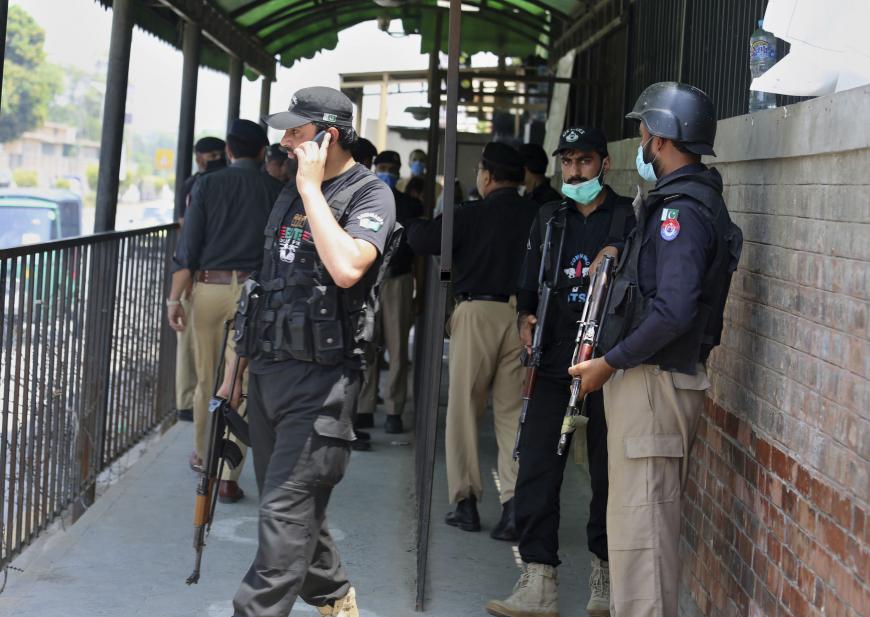
Nov 26, 2020 | Advocacy, News
Pakistani authorities should urgently and impartially investigate a surge in violent attacks on members of the Ahmadiyya religious community, Human Rights Watch, Amnesty International, and the ICJ said today.
The authorities should take appropriate legal action against those responsible for threats and violence against Ahmadis.
Since July 2020, there have been at least five apparently targeted killings of members of the Ahmadiyya community. In only two of the cases have the police taken a suspect into custody. Pakistani authorities have long downplayed, and at times even encouraged, violence against Ahmadis, whose rights to freedom of religion and belief are not respected under Pakistani law.
“There are few communities in Pakistan who have suffered as much as the Ahmadis,” said Omar Waraich, head of South Asia at Amnesty International. “The recent wave of killings tragically underscores not just the seriousness of the threats they face, but also the callous indifference of the authorities, who have failed to protect the community or punish the perpetrators.”
On November 20, a teenage assailant is alleged to have fatally shot Dr. Tahir Mahmood, 31, as he answered the door of his house in Nankana Sahib district, Punjab. Mahmood’s father and two uncles were injured in the attack. The police reported that the suspect “confessed to having attacked the family over religious differences.”
Several recent attacks have occurred in the city of Peshawar, in Khyber Pakhtunkhwa province. On November 9, Mahmoob Khan, 82, was fatally shot while waiting at a bus station. On October 6, two men on a motorcycle stopped the car of Dr. Naeemuddin Khattak, 57, a professor at the Government Superior Science College, and fired five shots, killing him. His family said he had a “heated argument over a religious issue” with a colleague a day before. Jamaat-i-Ahmadiyya, a community organization, issued a statement saying Khattak had previously received threats and was targeted because of his faith.
On August 12, Meraj Ahmed, 61, was fatally shot as he was closing his shop in Peshawar. On July 29, an alleged 19-year-old assailant killed Tahir Ahmad Naseem, 57, inside a high-security courtroom. Naseem was facing trial for blasphemy accusations. In a video that circulated on social media, the suspect states that Naseem was a “blasphemer.”
Successive Pakistani governments have failed to protect the human rights and security of the Ahmadiyya community. The penal code explicitly discriminates against religious minorities and targets Ahmadis by prohibiting them from “indirectly or directly posing as a Muslim.” Ahmadis are banned from declaring or propagating their faith publicly, building mosques, or making the Muslim call for prayer.
The authorities arbitrarily arrest, detain, and charge Ahmadis for blasphemy and other offenses because of their religious beliefs. The police have often been complicit in harassment and bringing fabricated charges against Ahmadis or have not intervened to stop anti-Ahmadi violence. The government’s failure to address religious persecution of Ahmadis has facilitated violence against them in the name of religion.
“Pakistan was part of the consensus at the UN General Assembly that required that states take active measures to ensure that persons belonging to religious minorities may exercise fully and effectively all their human rights and fundamental freedoms without any discrimination and in full equality before the law,” said Ian Seiderman, legal and policy director at the International Commission of Jurists. “The Pakistani government has completely failed to do so in the case of the Ahmadis.”
The Pakistani government also promotes discriminatory practices against Ahmadis. For example, all Pakistani Muslim citizens applying for passports are obliged to sign a statement explicitly stating that they consider the founder of the Ahmadi community an “imposter,” and consider Ahmadis to be non-Muslims.
Pakistani laws against the Ahmadiyya community violate Pakistan’s international legal obligations under the International Covenant on Civil and Political Rights (ICCPR), which Pakistan ratified in 2010, including the rights to freedom of conscience, religion, expression, and association, and to profess and practice one’s own religion.
Independent experts of the United Nations Human Rights Council, including the special rapporteurs on the freedom of religion or belief and the UN special rapporteur on minority issues, and the special rapporteur on extrajudicial, summary or arbitrary executions, have previously expressed concern at the persecution of the Ahmadiyya community in Pakistan.
“Pakistan’s federal and provincial governments should take immediate legal and policy measures to eliminate widespread and rampant discrimination and social exclusion faced by the Ahmadiyya community in Pakistan,” said Patricia Gossman, associate Asia director at Human Rights Watch. “The government should repeal the blasphemy law and all anti-Ahmadiyya provisions.”
Contact
In Brussels, for Human Rights Watch, Patricia Gossman: +32-472-982-925; or +1-347-322-8638 (WhatsApp); or gossmap@hrw.org. Twitter: @pagossman:
In Geneva, for the International Commission of Jurists, Ian Seiderman: e: ian.seiderman(a)icj.org
In Colombo, for Amnesty International, Omar Waraich: +44 7378 980870 (mobile); or omar.waraich@amnesty.org.
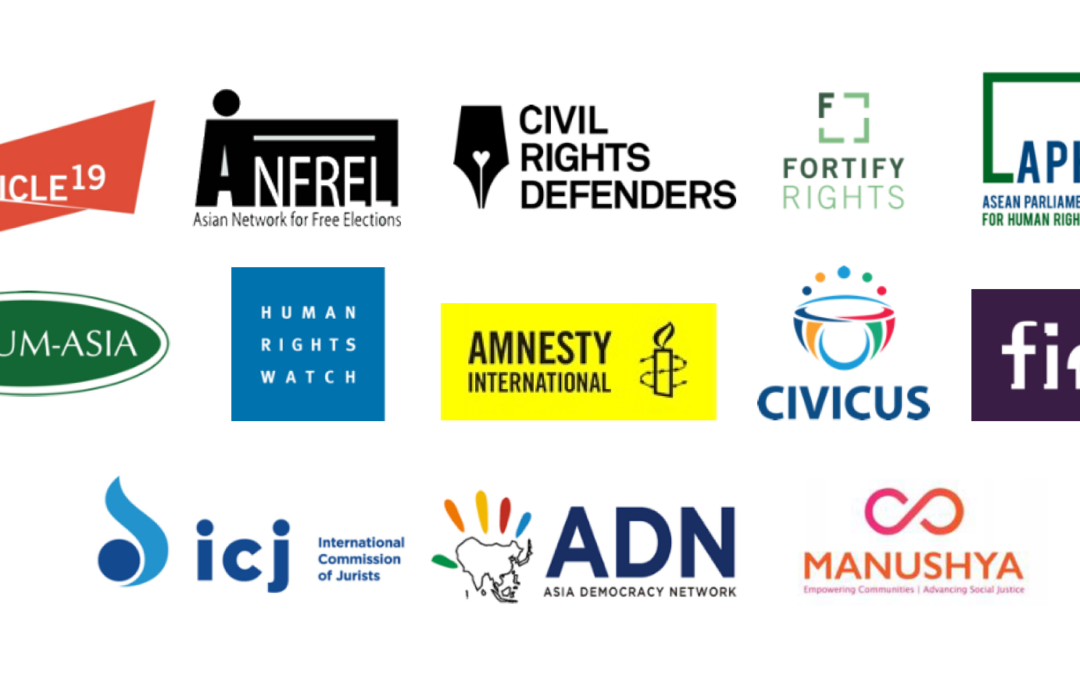
Nov 26, 2020 | Advocacy, News
Today, the ICJ joined other NGOs in condemning the Thai police’s use of force against peaceful protesters marching to the national parliament in Bangkok on November 17, 2020.
The statement reads:
We, the undersigned organizations, condemn the Thai police’s unnecessary and excessive use of force against peaceful protesters marching to the national parliament in Bangkok on November 17, 2020. We are concerned that authorities could employ similar measures when facing protesters who have declared they will march to the Siam Commercial Bank headquarters on November 25.
On November 17, police set out barriers and barbed wire to prevent a peaceful march organized by pro-democracy movements from reaching the parliament. Protesters planned to protest outside the parliament as members of parliament and senators debated seven different proposals for constitutional amendments, including an amendment proposed by the lawyers’ non-governmental organization iLAW (Internet Law Reform Dialogue), which was supported by the People’s Movement and its allies. Police refused to let protesters through the barriers, and when the demonstrators acted to breach those barriers, police crowd control units used water cannons laced with purple dye and an apparent teargas chemical, as well as teargas grenades and pepper spray grenades, to forcibly disperse thousands of demonstrators, including students, some of whom are children. Water cannons were first used at approximately 2:25 pm and police continued their efforts to disperse protesters, with constant use of water cannons, teargas and pepper spray into the evening.
Police also failed to prevent violence between pro-democracy protesters and royalist “yellow shirts” near the Kiak Kai intersection, near the parliament. Initially, riot police separated the two groups. However, video posted on social media later showed police officers informing the royalist protesters that they would withdraw and seconds later they vacated their position between the two groups. During the ensuing skirmishes, both sides were filmed throwing rocks and wielding clubs. Live broadcasts included sounds that appeared to be gunfire.
The Erawan Medical Centre reported that there were at least 55 protesters injured, mostly from inhaling teargas. It also reported that there were six protesters who suffered gunshot wounds. The injured included children: a kindergartener and elementary school students.
Although some pro-democracy protesters engaged in violent conduct in responding to royalist protesters, we emphasize that the overwhelming number of protesters were entirely peaceful. Furthermore, we wish to emphasize that while specific participants of an assembly who engage in violence are subject to a response that is lawful, strictly necessary and proportionate, they also retain all other human rights including the right to life, to security of person and to freedom from torture and other cruel, inhuman or degrading treatment or punishment.
International human rights law, as expressed in the International Covenant on Civil and Political Rights (ICCPR), which Thailand acceded to in 1996, protects the rights to freedom of expression (article 19) and peaceful assembly (article 21). But Thai authorities have routinely enforced censorship and stifled public assemblies, meetings, and discussions about human rights, political reforms, and the monarchy’s role in society.
In General Comment 37, which sets out the content Thailand’s legal obligations in guaranteeing the right of peaceful assembly, the United Nations Human Rights Committee—the body responsible for interpreting and applying the ICCPR—made clear that there is a presumption in favor of considering assemblies to be peaceful. Isolated acts of violence by individuals should not be attributed to others, to the organizers, or to the assembly as such. While the right of peaceful assembly may in certain cases be limited, the onus is for the State to justify any restrictions, which must pass the tests of legality, legitimacy, and necessity and proportionality.
Read the full statement in English and Thai.
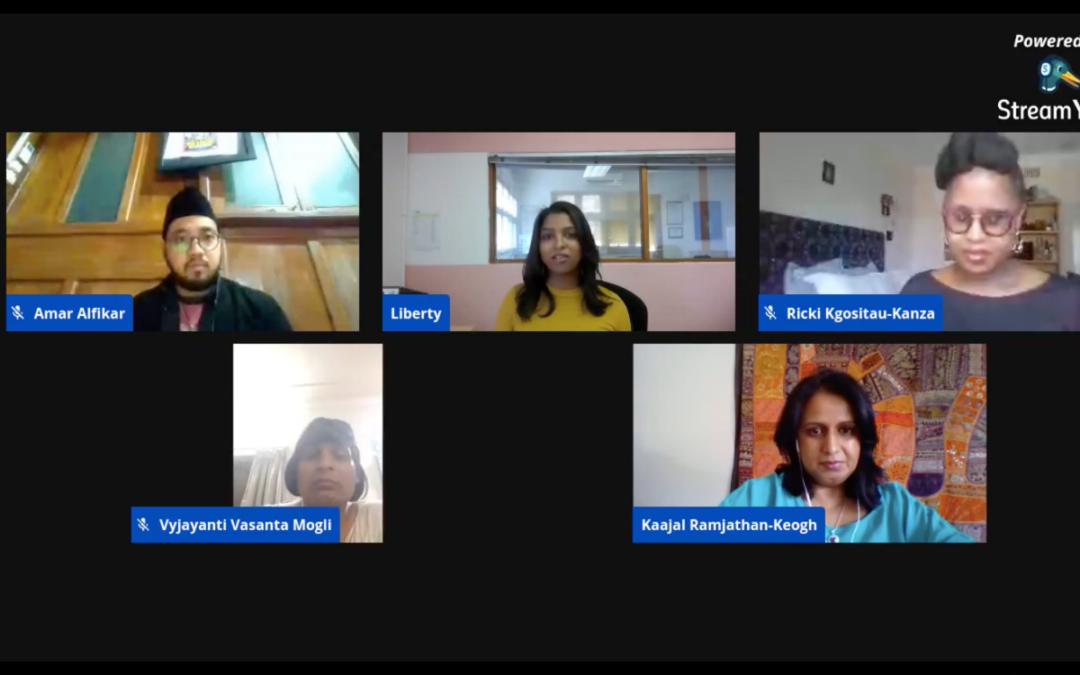
Nov 19, 2020 | News
On 18 November 2020, the ICJ hosted a Facebook Live with four transgender human rights activists from Asia and Africa. It highlighted the stark reality between progressive laws and violent lived realities of transgender people.
The 20th November 2020 marks the Transgender Day of Remembrance (TDOR), the day when transgender and gender diverse people who have lost their lives to hate crime, transphobia and targeted violence are remembered, commemorated and memorialized.
The discussions focused on their individual experiences of Transgender Day of Remembrance in their local contexts, the impact of COVID-19 on transgender communities and whether laws are enough to protect and enforce the human rights of transgender and gender diverse people.
The renowned panelists were from four different countries, Amar Alfikar from Indonesia, Liberty Matthyse from South Africa, Tshepo Ricki Kgositau-Kanza from Botswana and Vyjayanti Vasanta Mogli from India. The panel was moderated by the ICJ Africa Regional Director, Kaajal Ramjathan-Keogh.
The panel aimed to provide quick glimpses into different regional contexts and a platform for transgender human rights activists’ voices on the meaning of Transgender Day of Remembrance and the varied and devastating impacts of COVID-19 on transgender people.
The speakers discussed the meaning that they individually ascribe to Transgender Day of Remembrance. A common theme running across the conversations was that it is not enough to highlight issues and concerns of the transgender community only on this day. Instead, these discussions should be part of daily conversations about the human rights of transgender people at the local and international level.
Liberty Matthyse discussed the importance of remembering the transgender persons who have lost their lives over the past years, and added:
“South Africa generally is known as a country which has become quite friendly to LGBTI people more broadly and this, of course, stands in stark contradiction to the lived realities of people on the ground as we navigate a society that is excessively violent towards transgender persons and gay people more broadly.”
Amar Alfikar describes his work as “Queering Faiths in Indonesia”. This informs his understanding of what Transgender Day of Remembrance means in his country and he believes that:
“Religion should be a source of humanity and justice. It should be a space where people are safe, not the opposite. When the community and society do not accept queer people, religion should start giving the message, shifting the way of thinking and the way of narrating, to be more accepting, to be more embracing.”
It was clear from the discussions that a lot of the issues that have become prominent during the COVID-19 pandemic, have not arisen due to the pandemic. In fact, the COVID-19 pandemic has had the effect of a magnifying glass, amplifying existing challenges in the way that transgender communities are treated and driven to margins of society. Speaking about the intersectionality of transgender human rights, Vyjayanti Vasanta Mogli said:
“I don’t think LGBT rights or transgender rights exist in isolation, they are part of a larger gamut of climate change, racial equality, gender equality, the elimination of plastics, and all of that.”
The panelists had different opinions on whether it is enough to rely on the law for the recognition and protection of the human rights of transgender individuals.
The common denominator, however, was that the laws as they stand have a long way to go before fully giving effect to the right of equality before the law and equal protection of the law without discrimination of transgender people.
Tshepo Ricki Kgositau-Kanza, who was a litigant in a landmark case in Botswana in which the judiciary upheld the right of transgender persons to have their gender marker changed on national identity documents, explained the challenges with policies which, on their face, seem uniform:
“Uniform policies… are very violent experiences for transgender persons in a Botswana context where the uniform application of laws and policies is binary and arbitrarily assigned based on one’s sex marker on one’s identity document which reflects them either as male or female. Anybody in between or outside of that kind of dichotomy is often rendered invisible and vulnerable to a system that can easily abuse them.”
This conversation can be viewed here.
Contact
Tanveer Jeewa, Communications Officer, African Regional Programme, e: tanveer.jeewa(a)icj.org
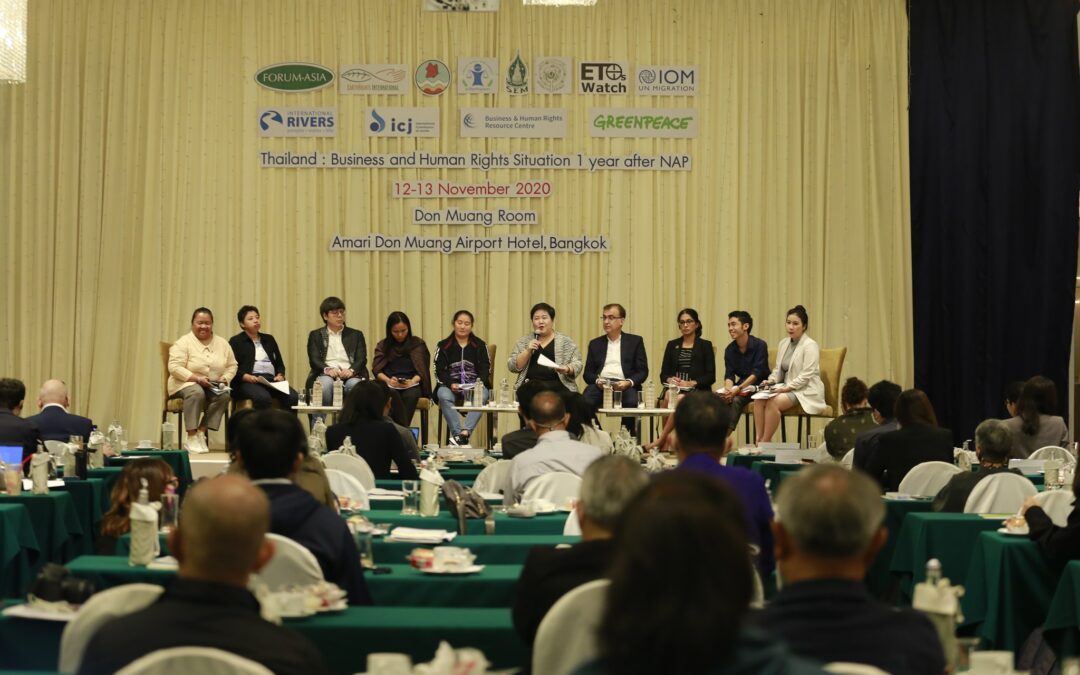
Nov 14, 2020 | Advocacy, News
On 12-13 November 2020, the ICJ co-hosted a discussion on “Thailand’s National Action Plan on Business and Human Rights: 1-Year Progress Review” in Bangkok. The forum was co-organized with other 11 organizations.
Participants on the first day included some 95 individuals representing populations affected by business operations from all regions of Thailand and members of civil society organizations. The considered reviewed the progress that has been made by Thailand over the past year towards fulfilling its commitments in the four priority issues in its First National Action Plan on Business and Human Rights (NAP): (1) Labor; (2) Land, environment and natural resources; (3) Human rights defenders; and (4) Cross border investment and multi-national enterprises.
Several participants noted a lack of any evident and tangible progress in the NAP implementation and questioned the effectiveness of the NAP because it does not have the status of a law but is merely a resolution from the Council of Ministers. They further expressed concern at the lack of a comprehensive monitoring system in place to monitor NAP and its achievement according to the key recommendations aligned with the UN Guiding Principle on Business and Human Rights, and on legal harassment and intimidation faced by human rights defenders.
In the session regarding cross border investment and multi-national enterprises, the ICJ participants led the discussion regarding challenges to hold Thai companies accountable for human rights abuses which took place abroad. The participants looked into several obstacles to accessing to justice for victims of business-related human rights abuses in the context of cross-border investment. The discussion was based on the ICJ’s work and analysis in the draft report on the human rights legal framework of Thai companies operating in Southeast Asia, which is expected to be launched in December 2020.
Comments and recommendations raised by participants on the first day were presented to representatives from the Ministry of Justice, Thailand National Human Rights Commission, Global Compact Network Thailand and UN agencies, in the public seminar on the second day. The outcomes of the discussion and recommendations will also be submitted to the NAP Monitoring/Steering Committees, chaired by Director-General of Rights and Liberties Protection Department, Ministry of Justice.
Background
On 29 October 2019, the Cabinet approved and adopted the First National Action Plan on Business and Human Rights (2019-2022), making Thailand the first country in Asia to adopt the stand-alone NAP.
The NAP emphasizes the duties of State agencies to review and amend certain laws, regulations and orders that are not in compliance with human rights laws and standards and ensure their full implementation; ensure accessibility of mechanisms for redress and accountability for damage done to affected communities and individuals; overcome the barriers to meaningful participation of communities and key affected populations; and strengthen the role of businesses to “respect” human rights on a variety of key priority issues.
The event was co-hosted with:
- International Organization for Migration (IOM)
- Community Resource Centre Foundation (CRC)
- Asian Forum for Human Rights and Development (FORUM-ASIA)
- EarthRights International (ERI)
- The Mekong Butterfly (TMB)
- International River (IR)
- Spirit in Education Movement (SEM)
- Thai Extra-Territorial Obligations Working Group (Thai ETOs Watch)
- Green Peace Thailand
- Green South Foundation
- Business and Human Rights Resource Center (BHRRC)
Further reading
Thailand’s Legal Frameworks on Corporate Accountability for Outbound Investments
Thailand: ICJ co-hosts discussion on National Action Plan on Business and Human Rights







